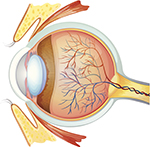
Up in space, astronauts get an eyeful of spectacular views, but their time there can blur their vision. NASA is looking into whether prolonged stays in space is giving astronauts bad eyesight. They believe pressure buildup in the cranium can cause VIIP or visual impairment intracranial pressure. About half of long duration mission astronauts such as those who work on the International Space Station have reported changes in their vision, usually involving farsightedness.
That means their near vision is poorer. These astronauts all had normal preflight eye pressures, healthy eyes, and were taking no medications that could increase eye pressure. They also spent 6 months or more in space. Upon returning doctors found a flattening at the back of their eyeballs and inflammation of their optic nerves. Unfortunately for some the changes were permanent.
Normally, earth's gravity pulls fluids in the body down, however, in space that fluid ends up elsewhere including the skull where it increases the pressure on the brain and in the eye. But honing in on the cause of VIIP is challenging because testing for it is invasive, such as drilling a hole in the skull.
NASA is now looking at two non-invasive devices that can be used in space. The Vittamed 205 works by applying pressure to tissues around the eye using a pressure cuff. A sensor then measures blood flow through parts of the ophthalmic artery. The second device is called a cerebral cochlear fluid pressure analyzer which senses tiny displacements of the ear drum, to measure the pressure in the cranium.
If the next prize in space missions is Mars, finding a solution is a must.
More Information
Vision Impairment and Intracranial Pressure (VIIP)
The Vision Impairment and Intracranial Pressure (VIIP) project examined the effect of long-term exposure to microgravity on the structure of the eye along with change in distance and near vision of crew members before and after they returned to Earth.
Space Is Ruining Astronauts' Eyesight And No One Knows Why
The tricky syndrome might hamper our chances of getting to Mars.
Hyperopia (Farsightedness)
Farsightedness occurs if your eyeball is too short or the cornea has too little curvature. In these cases, your eye can't correctly focus the light that enters it.